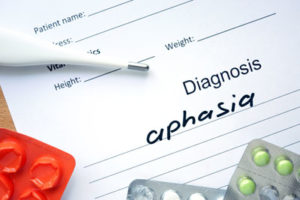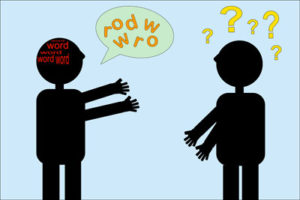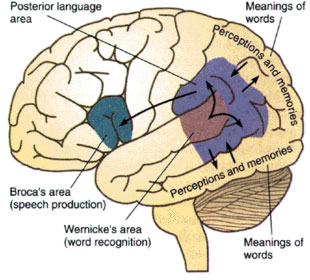Aphasia: Communicate Freely Again!
About Aphasia
 I wanted to share information about aphasia and the various methods from conventional, complementary and alternative approaches that helped me and many others to communicate freely once again.
I wanted to share information about aphasia and the various methods from conventional, complementary and alternative approaches that helped me and many others to communicate freely once again.
Q: What is Aphasia?
A: Aphasia is a language problem
Aphasia is an impairment in the ability to understand or express words or their nonverbal equivalents. There are many different types of aphasia, but most fall into one of three categories: expressive, receptive, and mixed.
Expressive Aphasia:
Expressive aphasia involves problems with spelling, sentence structure, verbal reasoning, and/or the rate of speech. The most common type of expressive aphasia is known as Broca’s aphasia. With this type of aphasia, a person is able to understand language but unable to produce speech fluently. Instead, words are spoken in a telegraphic manner, (with less than 3-4 words per sentence) using single words and gestures to convey meaning. The smaller words, such as articles (a, an, the), prepositions (of, from, etc.) are typically omitted. For example, a person with Broca’s aphasia or nonfluent aphasia talking about a plane trip might say, “Plane . . . me. . . .” and spread his or her arms like wings to make the point. Broca’s aphasia also involves the inability to repeat or write things that are heard.
 Another characteristic of expressive aphasia is when people experience neologisms, a condition marked by grammatical confusions, inappropriate word usage, and the substitution of nonsense words for real words. Anomia, another form of expressive aphasia, renders a person completely unable to name (familiar) objects, almost as if he or she were suddenly required to converse in a foreign language. A lesser form of this problem is dysnomia, which causes you to grope for words that you know but simply can’t think of. “It’s on the tip of my tongue,” and “You know, the whaddayacallit” are statements characteristic of people with word-retrieval problems.
Another characteristic of expressive aphasia is when people experience neologisms, a condition marked by grammatical confusions, inappropriate word usage, and the substitution of nonsense words for real words. Anomia, another form of expressive aphasia, renders a person completely unable to name (familiar) objects, almost as if he or she were suddenly required to converse in a foreign language. A lesser form of this problem is dysnomia, which causes you to grope for words that you know but simply can’t think of. “It’s on the tip of my tongue,” and “You know, the whaddayacallit” are statements characteristic of people with word-retrieval problems.
Receptive Aphasia:
Wernicke’s Aphasia includes both fluent aphasia and receptive aphasia. Fluent aphasia is a type of expressive aphasia that results in speech that is properly pronounced, grammatically correct, and effortlessly produced. However, it is often rapid, excessively wordy, and lacking in meaningful content. Receptive aphasia is a term that denotes problems with reading, interpreting, and comprehending spoken language. This problem affects the understanding of the meaning of spoken and written words. Your ability to articulate words may be unaffected, but even though you may be able to recognize the conversation of others, you may be unable to comprehend it, almost as if they were speaking a foreign language. Or you may be able to comprehend, but find yourself struggling to process one aspect of what is being said and missing much of the subsequent conversation. You may also engage in a great deal of meaningless verbalization.
Conductive aphasia is characterized by halting speech with word-finding pauses and concrete rephrasing of words.
Perseverative speech involves remaining on a topic or the uncontrolled repetition of words, phrases, sentences, or ideas.
Paraphasia is a type of receptive or expressive aphasia characterized by the substitution of parts of words or syllables for real words. Alexia, another form of receptive aphasia, is the inability to understand written language. Dyslexia involves difficulties with reading.
Mixed Aphasia:
Mixed aphasia is a problem with both the comprehension and expression of language.
What Causes Aphasia?
Aphasia is a result of injury to the brain, either from an acquired injury: stroke from a clot to the brain; cerebral bleed (aneurysm) and/or a traumatic injury, which is a brain injury from an outside force such as a bicycle accident, auto accident, or football accident.
In my situation, I had a cerebral bleed (aneurysm) while driving. I passed out and had a 60 mile an hour head-on automobile accident. Five months later I had brain surgery in the left frontal area.
Where in the Brain does Aphasia occur?
Several areas of the brain help to govern your ability to form words, express yourself, and understand spoken language. Even microscopic nerve-cell damage in one of these areas can disrupt your ability to process the auditory stimuli that precede and accompany verbal communication. Injury to the lower left hemisphere of the frontal lobe can damage Broca’s area—one of your speech centers—and hamper articulation (the ability to pronounce speech sounds) and fluency (the ability to combine sounds and words smoothly). If other parts of the frontal lobe bear the brunt of the blow, both your ability to concentrate on what you are saying and your attentiveness to the conversation of others may be affected. In general, you may be less able to use or understand verbal or written communication.
Damage to Wernicke’s area, located in the upper left hemisphere of the temporal lobe, can impair your ability to hear and interpret spoken words. You may have trouble understanding language and thus speak nonsense words out of context to the conversation. Language problems can also result if undetectable tearing or stretching of nerve-cell fibers hampers your powers of concentration and your ability to store and retrieve information. In addition, right temporal lobe damage can cause difficulties with nonverbal communication, which involves gestures, body posture, facial expressions, and eye contact.
Damage to the frontal lobes, particularly the prefrontal cortex, can impact conversation skills. People with executive functioning impairments often present with vague, non-specific comments, difficulty adding details to a conversation and may also be observed to have difficulty with initiation of questions/comments, verbal organization and ability to stay on topic (topic maintenance).
Treatment Methods and Practical Suggestions:
There are 3 main types of treatment: Conventional, Complementary and Alternative Approaches. The main difference between these three are coverage by insurance and/or the amount of scientific research that has been done in each area. Each of the various methods I personally know work, and are effective. Which one is best for you, I don’t know. Some people will only go to a medical doctor, while others totally refuse to ever see one. The following will allow you to choose what is best for you. Knowing this, I made sure in my our practice to have an integrative team of brain health experts. We do offer all the various types of services and are very effective in helping people with aphasia. Choose what is best for you.
1. Conventional Approaches
If your neurologist feels that intervention is indicated because of your lifestyle or the degree of your speech or language impairment, therapy with a speech/language pathologist is likely to be the first step. This type of therapy helps you learn to work around your deficits, stimulate or retrain your brain’s speech centers, learn strategies and monitor the redevelopment of your verbal skills, as needed.
Throughout the country, there are aphasia support groups. I received my doctorate from Boston University, which has an aphasia community group. It is a monthly meeting at Sargent College, Room, 102, 635 Commonwealth Ave, Boston, MA. The phone number is 617-353-0197. The coordinator is Jerry Kaplan. Also at Massachusetts General Hospital (MGH) there is an aphasia group run by Marge Nichols.
Psychotherapy may be suggested to help you cope with the frustration of feeling misunderstood and being unable to express yourself. Family counseling can also be helpful as a means of promoting patience, understanding, and teaching strategies to assist the person with speech related brain injury symptoms from stroke or traumatic brain injury (TBI).
2. Complimentary Approaches
Electromyography (EMG) biofeedback can also be very effective for improving speech; it teaches you to identify and recognize individual muscle movements in and around your mouth, while Neurofeedback can help find the dysregulated brain frequencies for stuttering, and word retrieval (word finding). Hypnosis can be very effective for improvement in articulation and stuttering. Hyperbaric Oxygen Therapy (HBOT) can also be very useful in cognitive and language repair. Acupuncture by a licensed acupuncturist has been shown to improve articulation.
3. Alternative Approaches
There are no established alternative treatments for expressive or receptive language problems. However, polarity therapy has been known to help stuttering in some cases. This hands-on technique should be applied by a trained polarity therapist. The American Polarity Therapy Association has more information on Polarity Therapy.
Practical Suggestions
At home and work, you can become practiced at analyzing your speech or language problems. Do you seem to struggle the most when you are fatigued or pressed for time? Are your thoughts disorganized, or does your problem seem to be purely physical?
Examining all aspects of your struggle to communicate can point the way to helpful communication, such as these that follow:
- To relax yourself and cut down on stuttering caused by stress, try inhaling deeply through your nose and exhaling through your mouth.
- Eliminate distractions to conversation. Your speech will flow more smoothly and you will have an easier time with comprehension if you talk in a quiet place.
- Gain a measure of control over stuttering by reading aloud to yourself, using a tape recorder and headphones. Start slowly and gradually increase your speed so that you learn to recognize—and then avoid—the point at which you start to stutter.
- Ask a friend or family member to give a prearranged signal when you are going off on a tangent or failing to make sense in conversation. A friend can also stand by at social gatherings to supply key words that escape you.
- Be honest about your problem both at work and at home. This will help you avoid embarrassment and promote patience and understanding in people who might otherwise judge you harshly.
- Temper any tendencies toward outspokenness for now, and avoid becoming involved in friendly debates. Doing so will save you a great deal of frustration.
- Try to visualize an elusive word as if it were written on a chalk-board, or try to hear the word in your head. If you still cannot retrieve the word, describe it or substitute another.
- Use a computer to communicate. Helpful software is widely available, including children’s language games and programs and the American Heritage Dictionary’s word-finding feature.
- Explore drawing, music, dance, journal-writing, and the theater as ways to help redevelop your language skills. Being inventive can help you think of many activities that stretch your ability to express yourself.
- Consider working with educational card and board games geared toward English as a Second Language (ESL) books. Contact the special-education department of your local public school system for specific suggestions and other helpful ideas.
- Practice synonyms and antonyms to help expand vocabulary.
- Watch movies with the sound turned off for practice interpreting gestures, expressions, body movements, and other forms of nonverbal communication.
- Write out important things to say before you say them.
- If your problem is an expressive one, consider learning American Sign Language as a temporary means of restoring your much-needed ability to communicate.
It is difficult to accept sudden deficits in speech or language, and very humbling to have to rely on others to help you communicate appropriately. It often helps to look at your verbal deficits as a transient symptom rather than a permanent disability. By seeking professional assistance and family support, developing strategies that work for you, and being realistic about occasional setbacks, you will pave the way for certain improvement in your speech and language skills. Also, in the internet era there are rehabilitation services providing tele-rehabilitation due to advances in speech therapy and tele-conferencing software. All that is needed is a standard computer and a broadband connection. Lots of rehabilitation practice limits the patient’s recovery, but interactive software, smartphone applications and patient team conferencing can be directed toward the goal of complementing inpatient and outpatient rehab for TBI.
My Story:
Before my stroke and subsequent concussions, I spoke in a rapid-fire fashion and was fond of embellishing my speech with lots of vivid analogies. Afterward, I spoke slowly in a halted manner, sometimes my words were slurred. I struggled to articulate, to say the words, and I spoke in a deliberate and noticeably concrete manner. While this tendency of speaking has faded over time, I still sometimes use a word or expression incorrectly. I also have an intermittent word-retrieval problem. I can picture the object and often can describe its function, yet I’m at loss for the correct word.
Services:
Because I lived through the effects of Aphasia, I have devoted my life and my practice to helping others like myself. That is why I developed the integrative team of services in my practice at Dr. Diane Brain Health. If we can’t help you here, the entire team is committed to helping you find the resources in your area. If there are no services in your area, we do provide virtual services with our team
Dr. Diane Roberts Stoler,
Copyright © May 20 2016
excerpts above from Chapter 21: Coping with Concussion and Mild Traumatic Brain Injury



My daughter in law had a severe stoke last July and cannot speak a word! Is there any hope of her e er speaking again? She is 61 years old, and they quit giving her speech therapy! She understand what we are saying to her,, but nothing comes out but babble! Please letme know what you think!
There is always health and hope. Please schedule a consult with Dr. Diane and she can provide resources and solutions to help your daughter-in-law.
After brainstroke on July 11 i got aphasiia. I can not peonounce R
Hello Bibhu,
Thank you for commenting. I hope you found this blog to be helpful. I experienced similar symptoms in my own recovery journey. If you’d like more information or would like to discuss different treatment options, please do not hesitate to reach out.
Have a wonderful rest of your day!
I live in Milford, ME. I had a ruptured AVM on October 2014. On October 16, I had an embolization to glue the bleed and on 17th had major brain surgery, at TUFTS in Boston. . I have visual impairment in the right field of both eyes, aphasia, and severe pain. I did speech but it did not improve significantly. I have had many CT’s, MRI/MRA, EEG, and appointments with my neurologist, in Bangor, ME but no help or findings. I need help.
Hi Michelle, please call my office, 800-500-9971, or use this website to schedule a consult, consults can be in-person at my Massachusetts office or via Zoom, and even telephone if needed. I can offer you help, solutions, and resources.